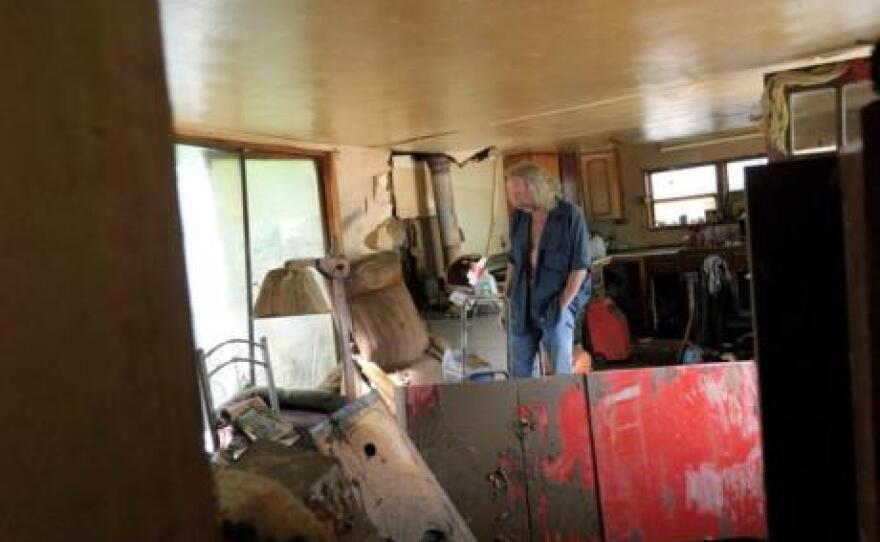By Erik Eisele
It’s been over a week since tropical storm Irene flooded parts of the White Mountains, washing out bridges and roads.
The flooding damaged millions of dollars of infrastructure, but in some places it was more than highways that suffered.
When Irene swept through northern New Hampshire it dumped more than six inches of rain in some places.
People found themselves stranded, either unable to leave their homes or unable to get back to them.
Some found they had nothing to come home to.
“Everything’s gone. I haven’t even been in there yet. I’m afraid. I looked through the windows and said I’m not going in there.”
Susan Blainey owns two houses in Transvale Acres, a campground turned housing development on the banks of the Saco River in Conway.
Only one of them survived the storm.
“We got the four-wheelers, we tried to get out. The water came in too quick so we just came back. We drove one four-wheeler into the back of a pickup truck and tied down the other one down and sat it through.”
The Conway fire department rescued twenty-two people that night.
They plucked one man off the roof of his trailer.
And rescued another family from a tree.
Now, residents are cleaning up and realizing just how much they lost.
“It came up about 52 inches. You see the mark right on the side there where the dirt stops? Right above the electric socket? It’s right there, about 52 inches off the ground.”
Merrimack Massachusetts resident Tom White bought his house in Conway a year ago.
“Where I am I guess this is a high spot or something, and they never get any water here. One of my neighbors actually parked his truck right here in my driveway. You can see the oil spot on the ground right there. He kayaked over from his house because he thought his truck was going to be safe here, and the water was up over the hood of his truck.”
Now the foundation of White’s home is caving in.
His furnace and appliances are all shot.
“All the sheetrock has to be gutted out and the insulation. Who knows what else. Like I said, we were hoping to move up here in a few years full-time. But, uh, I don’t know. We’ll have to think that one over.”
Transvale Acres was never meant to be a housing development.
It started as a campground in the 1960s, but people started living here year round.
There are nice houses on the rises, but the lower areas are filled with trailers and makeshift camps.
They are homes for people who can’t afford to live anywhere else.
Everyone knew Transvale was susceptible to flooding, so they put the trailers up on cinder-blocks.
Some homes have six, eight, ten foot tall foundations.
“This ain’t our first time down here. We’re somewhat prepared for it but we weren’t prepared for so much so fast, that’s what the biggest problem was.”
Dave O’Brien pokes through bushes downstream of his mother’s house with a ski pole.
“Just trying to pick through the debris, find the stuff laying around everywhere. It just keeps popping up. You think you get it all and you go look a little further and you find more of your stuff.”
Like most residents he’s used to floods, but not like this.
“I was wrapping up my firewood and it was just barely coming down D Road and within five minutes I was standing in four inches of water. And then within 45 minutes after that there was four feet here. It was amazing. Never seen it come in like that, and we’ve been here since 1980.”
Everyone here knows someone who lost everything.
Again, Susan Blainey.
“There’s families down back with babies. And they lost... there’s nothing you can salvage. It’s muck. It’s all muck.”
“It’s a lot of devastation. A lot of people have been affected. It’s mostly been low income people.”
Rick Christie is a volunteer with the American Red Cross.
He’s put in multiple thirteen-hour days since Irene.
He’s been around the state, and he says Transvale Acres is likely the worst hit place he’s seen.
“These areas down here are mostly mobile homes, trailers and things. Once they get wet, they’re pretty much totaled.”
SFX: generator
But people are salvaging what they can.
Some places still don’t have power, but on every street generators roar, powering fans to dry out houses.
The town brought in huge dumpsters they can’t seem to empty fast enough.
Billy Wilder used to own two trailers near the river.
“That one’s totally junk. This one here we’re going to save though. A little squeegeeing and tender loving care.”
His holiday, like most people here, was spent reclaiming what the Saco nearly destroyed.
“I didn’t want to sit down by the river this weekend anyway. It gives me something to do.”








